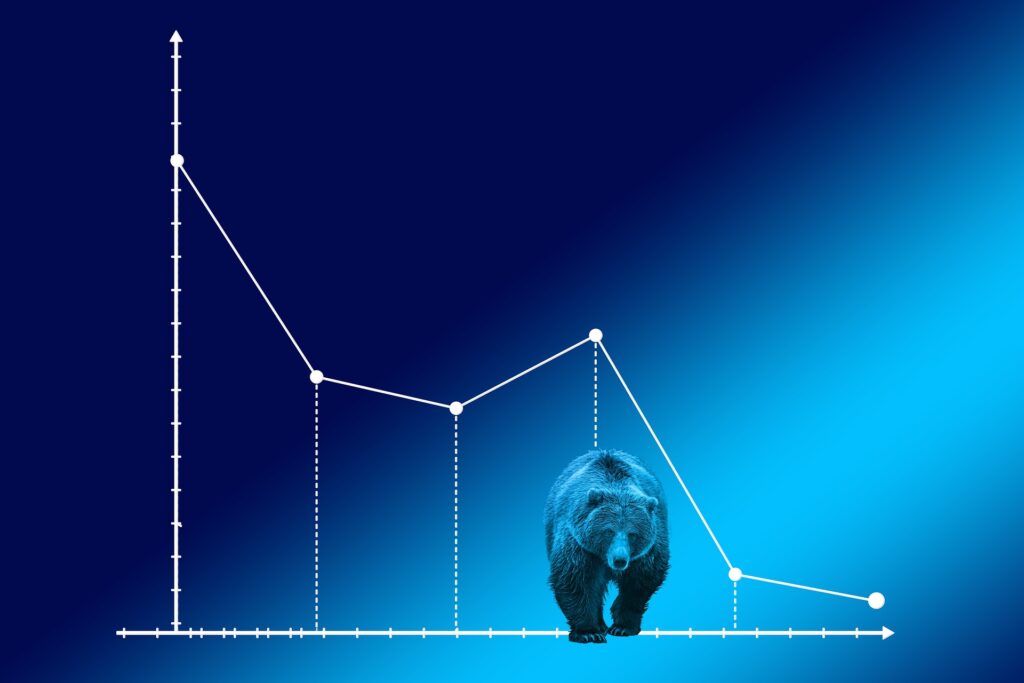One of the most popular stock market indices, the S&P 500, fell into bear market territory in mid-June, as it dropped over 20 percent from its most recent high point in early January 2022. Since then the S&P 500 has gained a little ground, but the roller coaster ride has largely continued as the stock market reacts to news about inflation, interest rates, the war in Ukraine, etc. Unsurprisingly, this market drop has created anxiety for many investors, especially combined with inflation and the negative impact of rising interest rates on bond funds. In this post, we discuss why investors might be worried and why they can reasonably try to keep their worries at bay.
Why Are Investors Concerned about the Bear Market?

1) Investors always worry about bear markets. There is no guarantee of returns when investing in the stock market, and even though the long-term rewards of diversified investing have been well proven over the last century, a little voice in our heads frequently makes us doubt that fact in the midst of a bear market.
Understandably, if investors are retired and are drawing from their portfolios, they may worry whether they have an adequate allocation to relatively safe investments (e.g. cash/bonds) or whether they will need to sell stock investments while the value is down. Especially if they need to sell low, they may also be concerned about whether their nest eggs are still poised to sustain them through their life expectancies.
Even those in the workforce who are still saving and investing regularly (and therefore can buy stocks “on sale” during a bear market) are often tempted to worry when the value of their investment accounts drops significantly, not knowing with certainty if/when the market will recover.
2) We’re out of practice. Prior to the current downturn, the last bear market (in the spring of 2020) was the shortest on record, lasting just over a month. We only had a matter of weeks to worry about our investments amid a swirl of school/workplace closures, quarantines, and social distancing measures before the market starting rebounding. Prior to the onset of Covid, we had passed 11 relatively peaceful years without a bear market.
3) We worry about what this means for the economy. As mentioned above, the term “bear market” just refers to a decline in the stock market of more than 20 percent. If investors do not sell their stock investments while the value is down, they only face temporary losses on paper, which will eventually be reversed. However, bear markets sometimes signal that we are (or will soon be) in an economic recession. A recession is a more widespread economic decline, generally accompanied by high unemployment. Combined with the recent surge of inflation, this could result in economic hardship for much of the population. While the possibility of a significant recession looms, the bear market will remain a cause for concern regarding our society at large.
Why Should Investors Not Worry about This Bear Market?
1) A bear market can be positive (or at least neutral) for your long-term investment returns. As mentioned above, for those who are still working and saving/investing regularly, a bear market allows them to make their regular stock purchases at a discount. For example, if you save monthly to a 401k, you are now buying shares of the mutual funds in your account at a discount relative to the price in January. Even if you are retired, you could benefit from the bear market if you are willing and able to rebalance your accounts and move some assets from cash/bonds into stocks while stocks are “on sale.” (Buy low, sell high!) If you do not have enough wiggle room in your retirement accounts (or adequate risk tolerance) to rebalance your portfolio toward stocks, you at least won’t lock in losses if you can rely on cash/bonds for needed withdrawals from your portfolio until the stock market recovers.
2) Thankfully, bear markets tend not to last as long as bull markets. Since 1929, the average bear market has lasted around 9.6 months, while the average bull market (stocks rising) has lasted around 2.7 years. During that time frame, the stock market has been in a bear market only 24 percent of the time and in a bull market the remaining 76 percent of the time. What does this past performance mean for investors? Don’t panic. Stay the course. Hopefully, we’ll reach the bottom of the bear market soon (if we haven’t already!) and will enjoy a longer bull market, recouping the recent losses and reaching new highs.
3) There are reasons to hope the current recession (if we are, in fact, in a recession) may not generate widespread economic hardship. One measure of the country’s economic productivity—Gross Domestic Product (GDP)—decreased in the first quarter of 2022 by an annualized rate of 1.6 percent, and it is estimated to have decreased again in the second quarter by 2.1 percent. (The second quarter figure will not be released officially until the end of this month.) While two quarters of negative growth meets the technical definition of a recession, the amount of decline has been minimal, and the unemployment rate is hovering near a 50-year low. While employment numbers remain strong, it reasonable to hope that we might avoid a significant recession this year.
At PFS, we know that you will face many bear markets throughout your working years and retirement, so we implement an investment strategy that takes that into account. We try to take advantage of the opportunities that a bear market presents while avoiding or minimizing potential losses. If you have any questions or concerns about what this means for your individual portfolio or financial plan, please do not hesitate to call or email any time.
If you have any questions about your financial future, we're here to help. Please use this form or feel free to call or e-mail us.
(703) 385-0870

